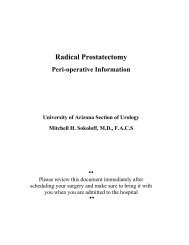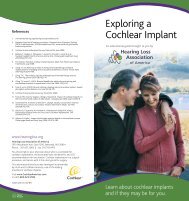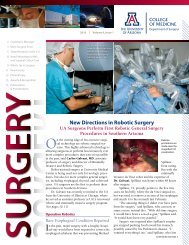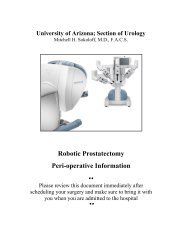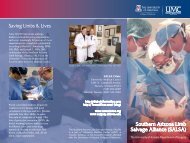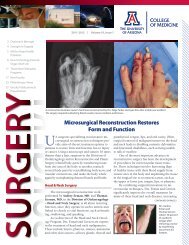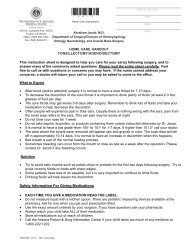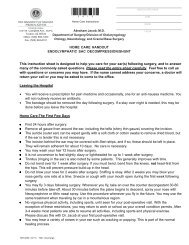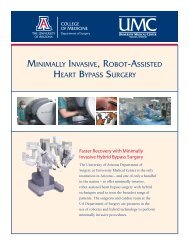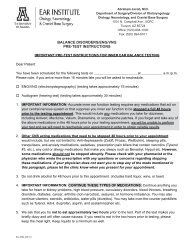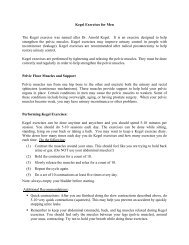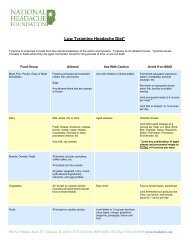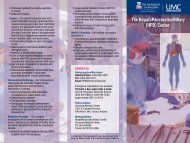General Surgery Housestaff Manual - Department of Surgery
General Surgery Housestaff Manual - Department of Surgery
General Surgery Housestaff Manual - Department of Surgery
Create successful ePaper yourself
Turn your PDF publications into a flip-book with our unique Google optimized e-Paper software.
<strong>General</strong> <strong>Surgery</strong> <strong>Housestaff</strong> <strong>Manual</strong><br />
Introduction<br />
INTRODUCTION TO SURGICAL RESIDENCY TRAINING 2<br />
GOVERNANCE OF THE RESIDENCY PROGRAM 2<br />
PROGRAM DIRECTOR, RESPONSIBILITIES 3<br />
ROTATIONS 4<br />
Educational Goals & Resident Responsibilities<br />
GLOBAL EDUCATIONAL GOALS 5<br />
PROGRAM-SPECIFIC EDUCATIONAL GOALS 7<br />
PGY-SPECIFIC EDUCATIONAL OBJECTIVES 8<br />
Orientation to the Clinical Services<br />
DUTY HOURS & CALL SCHEDULE POLICIES 11<br />
RESIDENT SUPERVISION POLICY 12<br />
COMMUNICATION WITH THE ATTENDING STAFF 13<br />
DRESS CODE 13<br />
RESIDENT PHYSICIAN RESPONSIBILITIES 14<br />
The Educational Program <strong>of</strong> the Residency<br />
SURGICAL SCIENCES CURRICULUM (DIDACTICS) 17<br />
SURGICAL MORBIDITY & MORTALITY CONFERENCE (M&M) 17<br />
SURGERY GRAND ROUNDS 17<br />
JOURNAL CLUB 17<br />
The Good Stuff<br />
VACATION POLICY 18<br />
SICK POLICY 18<br />
EDUCATIONAL / ACADEMIC TRAVEL POLICY 19<br />
MOONLIGHTING POLICY 19<br />
Resident Evaluation & Promotion<br />
CLINICAL EVALUATIONS 20<br />
SURGICAL SCIENCES CURRICULUM (DIDACTICS) 20<br />
AMERICAN BOARD OF SURGERY IN-TRAINING EXAMINATION (ABSITE) 20<br />
MOCK ORAL EXAMINATION 21<br />
STANDARDS OF RESIDENT PERFORMANCE & ADVANCEMENT 21<br />
CRITERIA FOR HONORS 21<br />
SATISFACTORY PERFORMANCE 22<br />
NOTICES OF DEFICIENCY & PROBATION 22<br />
PROBATION & DISMISSAL 23<br />
Appendix 1: Rotation-Specific Educational Goals<br />
Appendix 2: Weekly cases, Didactic schedules<br />
1
INTRODUCTION<br />
A. INTRODUCTION TO THE SURGICAL RESIDENCY TRAINING<br />
The RRC is charged with the responsibility <strong>of</strong> accrediting residency programs; general surgery<br />
residents graduating from accredited programs are certified by a separate organization, the<br />
American Board <strong>of</strong> <strong>Surgery</strong>. Upon successful application to the Board at the completion <strong>of</strong><br />
training, the applicant may sit for Part I (Qualifying Examination), a written test encompassing<br />
the basic and clinical sciences <strong>of</strong> surgical practice. After passing Part I, the applicant is<br />
permitted to take Part II, the Certifying Examination, an oral test <strong>of</strong> the surgeon’s ability to<br />
exercise sound judgment in various clinical situations.<br />
A fundamental education principle <strong>of</strong> any general surgery program is to adequately prepare the<br />
resident for Board Certification. Simply passing the Boards is not sufficient. The goal <strong>of</strong> the<br />
University <strong>of</strong> Arizona College <strong>of</strong> Medicine’s <strong>General</strong> <strong>Surgery</strong> program is to provide you with the<br />
best possible education and training for a career in general surgery or one <strong>of</strong> its disciplines.<br />
You have to actively participate in every aspect <strong>of</strong> the program, from the operating room to the<br />
classroom to derive the maximal benefit from your residency training. Self-instruction and<br />
motivation are the primary principles <strong>of</strong> adult education. You have been selected for this<br />
residency program primarily because the faculty believes that you can successfully fulfill the<br />
goals <strong>of</strong> the program.<br />
B. GOVERNANCE <strong>of</strong> the RESIDENCY PROGRAM<br />
The Program Director has ultimate authority and responsibility for all aspects <strong>of</strong> the residency<br />
program. However, the Program Director cannot be expected to perform all <strong>of</strong> these activities<br />
without considerable help from all <strong>of</strong> the faculty and residents. In general, the Program Director<br />
is responsible for the overall supervision <strong>of</strong> the academic responsibilities <strong>of</strong> the teaching<br />
faculty, maintenance <strong>of</strong> the academic milieu <strong>of</strong> the residency program, overall performance<br />
evaluation <strong>of</strong> each individual resident and each individual rotation, and the preparation <strong>of</strong><br />
documents necessary to comply with accreditation.<br />
The Residency Executive Committee meets monthly to manage short-term goals, address<br />
problems, and develop plans <strong>of</strong> corrective action. The overall direction <strong>of</strong> the residency,<br />
including promotion and retention decisions, allocation <strong>of</strong> clinical rotations, curriculum<br />
development and faculty and resident selection is overseen by the Residency Executive<br />
Committee.<br />
Additionally, there is a Resident Committee, comprised <strong>of</strong> representatives <strong>of</strong> each class<br />
selected by their peers. This committee represents the residents at the Governance Committee<br />
meetings and brings resident concerns to the attention <strong>of</strong> the faculty and residency leadership.<br />
The Governance Committee meets three or four times yearly and consists <strong>of</strong> the Residency<br />
Executive Committee and the Resident Committee. This committee acts as an advisory<br />
committee to the Program Director.<br />
2
<strong>General</strong> <strong>Surgery</strong> Program Director<br />
The Program Director <strong>of</strong> the <strong>General</strong> <strong>Surgery</strong> Residency is appointed by the Chair <strong>of</strong> the<br />
<strong>Department</strong> <strong>of</strong> <strong>Surgery</strong>. The Program Director is a full-time faculty member practicing at the<br />
integrated institutions <strong>of</strong> the residency program. The Program Director is certified by the<br />
American Board <strong>of</strong> <strong>Surgery</strong> and is on the medical staff <strong>of</strong> one <strong>of</strong> the integrated institutions<br />
participating in the program.<br />
The responsibilities <strong>of</strong> the Program Director include the following (adapted from RRC program<br />
requirements):<br />
• Prepare written statements about the educational goals <strong>of</strong> the program with respect to<br />
knowledge, skills, and other attributes <strong>of</strong> the residents at each level <strong>of</strong> training.<br />
• Prepare written statements about the expectations <strong>of</strong> the residents on each major rotation<br />
and/or other program assignments.<br />
• Designate appropriate and qualified surgeons to positions <strong>of</strong> teaching faculty and provide<br />
adequate supervision for the teaching faculty to guarantee that each rotation will have an<br />
adequate academic environment.<br />
• With the teaching faculty, select residents for appointment to the training program.<br />
• Develop a schedule <strong>of</strong> resident assignments to fulfill educational needs <strong>of</strong> each resident<br />
throughout the duration <strong>of</strong> the training program.<br />
• Monitor the educational activities <strong>of</strong> all rotations with respect to maintaining a balance<br />
between education and service obligations and assure that there is a prompt and reliable<br />
system for communication and interaction between residents and teaching faculty.<br />
• Implement a fair but comprehensive evaluation system so that each resident understands<br />
his/her progress through the training program. Identify deficiencies in resident performance<br />
and outline a plan <strong>of</strong> correction for each deficiency.<br />
• Ensure an adequate environment for the residents’ overall needs on each rotation. This<br />
includes the appropriate availability <strong>of</strong> relaxation time and time out <strong>of</strong> the hospital. For each<br />
rotation, the Program Director must assure adequate resources for sleeping, relaxing, and<br />
studying for each resident assigned to that rotation.<br />
• Provide complete and accurate program information and resident operative records to the<br />
Residency Review Committee so that appropriate assessments <strong>of</strong> the training program can<br />
be made.<br />
• Develop and direct the core curriculum <strong>of</strong> the weekly didactic program <strong>of</strong> clinical and basic<br />
sciences, regularly scheduled conferences, such as Grand Rounds, and other organized<br />
teaching activities.<br />
• Evaluate the results <strong>of</strong> the ABSITE in order to improve the curriculum and to counsel<br />
individual residents regarding performance.<br />
• Work with all teaching faculty to improve the educational content <strong>of</strong> each rotation.<br />
• Evaluate educational versus service responsibilities on the various rotations, and develop<br />
recommendations for improving the educational climate <strong>of</strong> those rotations.<br />
• Semi-annually, review each resident’s academic performance (including ABSITE results,<br />
quizzes, mini-in service scores, etc.) and recommend the appropriate academic status for<br />
each resident to the Residency Executive Committee.<br />
• Periodically assess the quality <strong>of</strong> each rotation, based on resident evaluation and other<br />
criteria, and report those findings to the Residency Executive Committee and to the<br />
responsible service directors.<br />
3
C. ROTATIONS<br />
The RRC specifies in considerable detail what clinical experiences must be included in a<br />
general surgery residency program; the rotations in the five clinical years <strong>of</strong> our residency<br />
program conform to that “blueprint”. During the first two years <strong>of</strong> training, about half <strong>of</strong> the<br />
rotations are devoted to general surgery and its principal components (e.g. trauma, vascular<br />
surgery, etc.) with experience in surgical specialties and other specialties (e.g. anesthesia)<br />
constituting the other half. In the third, fourth and fifth years, about two-thirds <strong>of</strong> the time is spent<br />
on general surgical services; the other rotations include components <strong>of</strong> general surgery, such as<br />
transplant, pediatric, and vascular surgery.<br />
4
EDUCATIONAL GOALS & RESIDENT RESPONSIBILITIES<br />
The University <strong>of</strong> Arizona <strong>General</strong> <strong>Surgery</strong> Residency Program includes a preliminary track<br />
(one or two years <strong>of</strong> training) and a categorical track (five or more years <strong>of</strong> clinical training.)<br />
The program encompasses training in general surgery, its principal and additional components<br />
and related surgical specialties. The fundamental education goal <strong>of</strong> the training program is to<br />
provide a complete education in the basic and clinical science <strong>of</strong> general surgery, preparing<br />
the post-graduate for:<br />
• the practice <strong>of</strong> clinical general surgery, and/or<br />
• further specialty education and training, and/or<br />
• a career in academic surgical investigation and teaching.<br />
A. GLOBAL EDUCATIONAL GOALS<br />
The ACGME has endorsed general competencies for all residents in the areas <strong>of</strong>: patient care,<br />
medical knowledge, practice-based learning and improvement, interpersonal and<br />
communication skills, and systems-based practice as follows:<br />
Patient Care<br />
Residents must be able to provide patient care that is compassionate, appropriate, and<br />
effective for the treatment <strong>of</strong> health problems and the promotion <strong>of</strong> health. Residents are<br />
expected to:<br />
• communicate effectively and demonstrate caring and respectful behaviors when<br />
interacting with patients and their families<br />
• make informed decisions about diagnostic and therapeutic interventions based on<br />
patient information and preferences, up-to-date scientific evidence, and clinical<br />
judgment<br />
• develop and carry out patient management plans<br />
• counsel and educate patients and their families<br />
• use information technology to support patient care decisions and patient education<br />
• perform competently all medical and invasive procedures considered essential for the area<br />
<strong>of</strong> practice<br />
• provide health care services aimed at preventing health problems or maintaining health<br />
• work with health care pr<strong>of</strong>essionals, including those from other disciplines, to provide<br />
patient-focused care<br />
Medical Knowledge<br />
Residents must demonstrate knowledge about established and evolving biomedical, clinical,<br />
and cognate (e.g. epidemiological and social-behavioral) sciences and the application <strong>of</strong> this<br />
knowledge to patient care. Residents are expected to:<br />
• demonstrate an investigatory and analytic thinking approach to clinical situations<br />
• know and apply the basic and clinically supportive sciences which are appropriate to their<br />
discipline<br />
5
Practice-based Learning & Improvement<br />
Residents must be able to investigate and evaluate their patient care practices, appraise and<br />
assimilate scientific evidence, and improve their patient care practices. Residents are<br />
expected to:<br />
• analyze practice experience and perform practice-based improvement activities using a<br />
systematic methodology<br />
• locate, appraise, and assimilate evidence from scientific studies related to their patients’<br />
health problems<br />
• obtain and use information about their own population <strong>of</strong> patients and the larger population<br />
from which their patients are drawn<br />
• apply knowledge <strong>of</strong> study designs and statistical methods to the appraisal <strong>of</strong> clinical<br />
studies and other information on diagnostic and therapeutic effectiveness<br />
• use information technology to manage information, access on-line medical information,<br />
and support their own education<br />
• facilitate the learning <strong>of</strong> students and other health care pr<strong>of</strong>essionals<br />
Interpersonal & Communication Skills<br />
Residents must be able to demonstrate interpersonal and communication skills that result in<br />
effective information exchange and teaming with patients, their patients families, and<br />
pr<strong>of</strong>essional associates. Residents are expected to:<br />
• create and sustain a therapeutic and ethically sound relationship with patients<br />
• use effective listening skills and elicit and provide information using effective nonverbal,<br />
explanatory, questioning, and writing skills<br />
• work effectively with others as a member or leader <strong>of</strong> a health care team or other<br />
pr<strong>of</strong>essional group<br />
Pr<strong>of</strong>essionalism<br />
Residents must demonstrate a commitment to carrying out pr<strong>of</strong>essional responsibilities,<br />
adherence to ethical principles, and sensitivity to a diverse patient population. Residents are<br />
expected to:<br />
• demonstrate respect, compassion, and integrity; a responsiveness to the needs <strong>of</strong> patients<br />
and society that supersedes self-interest; accountability to patients, society, and the<br />
pr<strong>of</strong>ession; and a commitment to excellence and on-going pr<strong>of</strong>essional development<br />
• demonstrate a commitment to ethical principles pertaining to provision or withholding <strong>of</strong><br />
clinical care, confidentiality <strong>of</strong> patient information, informed consent, and business<br />
practices<br />
• demonstrate sensitivity and responsiveness to patients’ culture, age, gender, and<br />
disabilities<br />
6
Systems-based Practice<br />
Residents must demonstrate an awareness <strong>of</strong> and responsiveness to the larger context and<br />
system <strong>of</strong> health care and the ability to effectively call on system resources to provide care that<br />
is <strong>of</strong> optimal value. Residents are expected to:<br />
• understand how their patient care and other pr<strong>of</strong>essional practices affect other health care<br />
pr<strong>of</strong>essionals, the health care organization, and the larger society and how these elements<br />
<strong>of</strong> the system affect their own practice<br />
• know how types <strong>of</strong> medical practice and delivery systems differ from one another,<br />
including methods <strong>of</strong> controlling health care costs and allocating resources<br />
• practice cost-effective health care and resource allocation that does not compromise<br />
quality <strong>of</strong> care<br />
• advocate for quality patient care and assist patients in dealing with system complexities<br />
know how to partner with health care managers and health care providers to assess,<br />
coordinate, and improve health care and know how these activities can affect system<br />
performance<br />
B. PROGRAM-SPECIFIC EDUCATIONAL GOALS<br />
1. To acquire a comprehensive knowledge base, clinical decision-making ability, and<br />
technical skills in the principal components <strong>of</strong> general surgery, which include:<br />
• the abdomen<br />
• the alimentary tract<br />
• the breast<br />
• critical care<br />
• the endocrine system<br />
• the head and neck<br />
• the skin and s<strong>of</strong>t tissues<br />
• transplantation<br />
• trauma and emergency surgery<br />
• the vascular system<br />
2. Acquire a broad experience in the additional components <strong>of</strong> general surgery, including<br />
acquisition <strong>of</strong> the appropriate knowledge bases, the development <strong>of</strong> specific technical skills,<br />
and an understanding <strong>of</strong> the principles <strong>of</strong> decision-making particular to the specialty.<br />
The additional components include:<br />
• anesthesiology<br />
• cardiothoracic surgery<br />
• endoscopy<br />
• neurologic surgery<br />
• orthopedic surgery<br />
• pediatric surgery<br />
• urologic surgery<br />
7
3. To acquire the ability to quickly and effectively assess, stabilize, and manage (operatively or<br />
non-operatively, as appropriate) the patient with severe multiple injuries, regardless <strong>of</strong> the<br />
organ systems involved.<br />
4. To demonstrate the intellectual curiosity and commitment required to participate fully in the<br />
didactic curriculum <strong>of</strong> the residency program and to develop personal, life-long habits <strong>of</strong> selfstudy<br />
and continuing education.<br />
5. To develop pr<strong>of</strong>essional habits consistent with sound, ethical medical practice, including:<br />
• effective interpersonal relationships with peers and other health pr<strong>of</strong>essionals<br />
• a compassionate attitude toward patients, their families and friends<br />
• clarity and timeliness <strong>of</strong> written communication in the medical record and elsewhere<br />
C. PGY SPECIFIC EDUCATIONAL OBJECTIVES<br />
As the surgical residency program is seen primarily as an educational endeavor, certain<br />
educational objectives have been set for residents at each level <strong>of</strong> training. A brief description <strong>of</strong><br />
the objectives follows.<br />
All Residents<br />
1. Spend at least two half days/week in an ambulatory setting as appropriate for the rotation.<br />
This experience will focus on providing pre- and postoperative care to the patient.<br />
2. Maintain a log <strong>of</strong> operative procedures. This will be done electronically via the ACGME<br />
website http://www.acgme.org/. We will monitor the case logs on a quarterly basis. The<br />
ACGME Case Log Quota states the numbers <strong>of</strong> cases a resident should have logged at the<br />
end <strong>of</strong> a given training year as the following:<br />
• PGY 1 - 100 cases<br />
• PGY 2 - 250 cases<br />
• PGY 3 - 400 cases<br />
• PGY 4 - 600 cases<br />
• PGY 5 - 750 cases (150 in Chief year)<br />
If residents have not entered the expected number <strong>of</strong> cases (30 minimum/per quarter),<br />
operative privileges will be withheld, other clinical duties will continue until case logs are up<br />
to date. If the resident is up to date but has deficiencies compared with their peers in<br />
categories or index cases, then their rotations may be modified to correct the deficiencies.<br />
3. Maintain a list <strong>of</strong> SICU experiences in a manner acceptable to the RRC and the American<br />
Board <strong>of</strong> <strong>Surgery</strong> (ABS).<br />
4. Attend at least 70% <strong>of</strong> all didactic and education meetings conducted by the Program.<br />
5. Read your mail, check email and empty your <strong>Housestaff</strong> mailbox on a weekly basis.<br />
6. Log duty hours weekly.<br />
8
Junior Residents (PGY 1 & PGY 2)<br />
• Perform comprehensive history and physical assessment and share information with senior<br />
resident and/or attending.<br />
• Use available information, in combination with the interpretation <strong>of</strong> basic laboratory and<br />
radiographic data, to develop a plan for the preoperative preparation <strong>of</strong> the patient and<br />
discuss with the senior resident and/or attending.<br />
• Understand the basic pathophysiologic disease process and its surgical implications.<br />
• Understand the decision-making process required <strong>of</strong> the surgeon and the principles on<br />
which the decisions are based.<br />
• Understand the basics <strong>of</strong> the surgical procedures performed, including tubes placed, drains<br />
placed, lines placed, etc.<br />
• With the aid <strong>of</strong> the senior resident and/or attending, develop a postoperative plan <strong>of</strong> care<br />
and surveillance. Anticipate problems particular to the patient or disease entity.<br />
• Provide for the day-to-day care <strong>of</strong> patients on your service- write admission orders, organize<br />
tasks, obtain data, etc.<br />
• Serve as instructor to medical students and supervise their assigned tasks along with the<br />
senior resident.<br />
• Develop the interpersonal skills necessary for dealing with patients, nursing staff, fellow<br />
residents and attending staff.<br />
• Master the principles <strong>of</strong> basic surgical biology as they influence care <strong>of</strong> the surgical patient.<br />
• Accomplish the objectives stated for each rotation.<br />
• Learn basic surgical skills under supervision: sterile technique, OR conduct, dressing<br />
changes, wound care, and basic surgical procedure.<br />
• Successfully complete ACLS and ATLS programs.<br />
Senior Residents (PGY 3 & PGY 4)<br />
• Provide supervision <strong>of</strong> the junior resident in carrying out patient care responsibility<br />
to include:<br />
• Confirm and review pertinent history and physical findings with the junior resident.<br />
• Review subjective and objective evidence <strong>of</strong> patient progress or complications with<br />
the junior resident.<br />
• Review pertinent laboratory and imaging data with the junior resident.<br />
• Modify (as needed) patient care plan developed by the junior resident.<br />
• Communicate details <strong>of</strong> patient progress or complications to attending surgeon timely.<br />
• Master the sophistication <strong>of</strong> the pathophysiology <strong>of</strong> the patient’s disease process.<br />
• Master the elements <strong>of</strong> preoperative preparation <strong>of</strong> the surgical patient, especially in<br />
consideration <strong>of</strong> existing co-morbid factors.<br />
• Understand the principles <strong>of</strong> the operative procedure including pertinent anatomy and<br />
technical considerations as well as decision-making processes.<br />
• Develop with attending surgeon a postoperative plan <strong>of</strong> care considering co-morbid factors,<br />
basic disease process and conduct <strong>of</strong> operative procedure.<br />
• Supervise the junior resident in the day-to-day execution <strong>of</strong> the care plan.<br />
• Educate junior and senior medical students in basic surgical diseases, surgical biology<br />
and the conduct <strong>of</strong> pre, intra and postoperative care <strong>of</strong> the surgical patient.<br />
• Refine interpersonal skills in dealing with patients, staff, fellow residents and attendings.<br />
9
• Learn surgical techniques (under supervision <strong>of</strong> attending surgeon) specific to rotation.<br />
• Become conversant with the published surgical literature.<br />
Chief Residents (PGY 5)<br />
• Provide supervision <strong>of</strong> the junior resident in carrying out patient care responsibilities for the<br />
patient chosen by the chief resident for care (patients with complex surgical problems).<br />
• Communicate the details <strong>of</strong> patient progress or complications to attending.<br />
• Understand at a sophisticated level the pathophysiology <strong>of</strong> the patient’s disease processes.<br />
• Perfect the elements <strong>of</strong> pre-operative preparation <strong>of</strong> the surgical patient, especially in<br />
consideration <strong>of</strong> existing co-morbid factors.<br />
• Understand, in depth, the principles <strong>of</strong> the operative procedure including pertinent anatomy<br />
and technical consideration and the decision-making process.<br />
• Develop with the attending physician a postoperative plan <strong>of</strong> care considering co-morbid<br />
factors, basic disease process, and the conduct <strong>of</strong> the procedure.<br />
• Master the interpersonal skills in dealing with patients, staff, fellow residents, and<br />
attendings.<br />
• Master the surgical technique (under supervision <strong>of</strong> attendings) specific to those patients<br />
with complex surgical problems.<br />
• Function as consultant to junior and senior residents as needed.<br />
• Function as educator <strong>of</strong> surgical house staff and medical students.<br />
• Function as administrator <strong>of</strong> the junior and senior resident staff.<br />
10
ORIENTATION TO THE CLINICAL SERVICES<br />
A. Duty Hours & Call Schedule Policies<br />
The purpose <strong>of</strong> the duty hour policy is to provide residents with a carefully planned, sound<br />
academic and clinical education that balances patient care, safety and resident wellbeing. The<br />
Program ensures that the learning objectives <strong>of</strong> the residency are not compromised by<br />
excessive reliance on residents to fulfill service obligations. Didactic and clinical education must<br />
have priority in the allotment <strong>of</strong> residents’ time and energy. Duty hour assignments must<br />
recognize that faculty and residents collectively have responsibility for the safety and welfare <strong>of</strong><br />
patients.<br />
Duty Hours<br />
• Duty hours are defined as all clinical and academic activities related to the residency<br />
program.<br />
• Duty hours are limited to 80 hours/week, averaged over a four-week period, inclusive <strong>of</strong> all<br />
in-house call activities.<br />
• Residents must be provided with 1 day (24-hour period) in 7 days free from all educational,<br />
clinical and administrative responsibilities, averaged over a four-week period, inclusive <strong>of</strong><br />
call.<br />
• There must be a duty-free interval <strong>of</strong> at least 10 hours prior to returning to duty.<br />
On-Call Activities<br />
• In-house call must occur no more frequently than every third night, averaged over a fourweek<br />
period.<br />
• Continuous on-site duty, including in-house call, must not exceed 24 consecutive hours.<br />
Residents may remain on duty for up to 6 additional hours to participate in didactic activities<br />
or transfer <strong>of</strong> patients.<br />
• No new patients may be accepted after 24 continuous hours on duty.<br />
• Residents may participate in procedures on patients previously scheduled for outpatient or<br />
A.M. admission surgery after 24 continuous hours on duty if doing so does not exceed 6<br />
additional duty hours.<br />
• Services with home-call will be carefully monitored for excessive sleep interruption to ensure<br />
adequate rest.<br />
• Residents on home-call must have one day (24 hours) per week free <strong>of</strong> all clinical and<br />
educational duties.<br />
• Residents on home-call who return to the hospital must count all hours spent at the hospital<br />
toward the total duty hours.<br />
11
Oversight<br />
• Continuous monitoring <strong>of</strong> duty hours will be required by each service.<br />
• Oversight will ensure an appropriate balance between education and service.<br />
• The Program Director will review all services on a monthly basis and report findings to the<br />
Residency Executive Committee.<br />
• A service that is not in compliance with the duty hours policy will have the residents removed<br />
from the service until corrective action has been taken.<br />
B. Resident Supervision<br />
Operative Procedures<br />
It is the policy <strong>of</strong> the <strong>Department</strong> <strong>of</strong> <strong>Surgery</strong> that an attending surgeon participates in all<br />
operative procedures performed, as well as supervises other aspects <strong>of</strong> each patient’s care.<br />
This participation is important, not only in the context <strong>of</strong> patient care and administrative<br />
responsibility, but also in fulfilling the educational mission <strong>of</strong> the <strong>Department</strong>.<br />
However, under appropriate circumstances, senior residents may benefit from the experience <strong>of</strong><br />
assuming responsibilities for independently executing surgical procedures. The following<br />
conditions, however, MUST ALWAYS apply:<br />
1. Every patient undergoing an operative procedure must have an assigned attending<br />
surgeon, identified by name in the medical record.<br />
2. Only the responsible attending surgeon may empower a senior resident to proceed with an<br />
operative procedure in the attending’s absence. However, the attending surgeon must<br />
remain available to respond in a timely fashion should assistance by the resident be<br />
requested.<br />
3. Operating room personnel may, at any time, request verification <strong>of</strong> the attending’s<br />
permission to proceed. Concerns regarding the appropriateness <strong>of</strong> that decision or the<br />
subsequent execution <strong>of</strong> the procedure are to be discussed with the attending surgeon, the<br />
Section Chief, or the <strong>Department</strong> Chair.<br />
Invasive Procedures<br />
The Attending surgeon also has responsibility for all invasive procedures performed upon his or<br />
her patients outside the operating room. These include, but are not limited to central line<br />
placement, pulmonary artery catheterization, arterial line placement, endotracheal intubation,<br />
etc. Most such procedures are performed either in the Intensive Care Unit or in the Emergency<br />
<strong>Department</strong> although on occasion these procedures are performed in other hospital units, e.g.,<br />
surgical wards. Junior residents who are not ‘privileged’ to perform a given procedure must be<br />
supervised by a senior resident who is so privileged.<br />
PGY II-V residents are privileged to perform invasive procedures after the satisfactory<br />
completion <strong>of</strong> the PGY II CCM rotation or the supervised completion <strong>of</strong> a minimal number <strong>of</strong><br />
12
cases (see below). For residents (PGY II-V) who have not met the criterion stated above,<br />
attending evaluation and documentation <strong>of</strong> the resident’s competence in the procedures is<br />
required in order for the resident to be privileged.<br />
Junior residents may also be privileged by the documented satisfactory performance, under<br />
supervision, <strong>of</strong> the following procedures in the numbers <strong>of</strong> cases indicated:<br />
• Central line placement 10 Cases CPT code 36656<br />
• Pulmonary artery catheterization 5 Cases CPT code 93503<br />
• Arterial line insertion 10 Cases CPT code 36620<br />
• Endotracheal intubation 10 Cases CPT code 31500<br />
• Chest tube insertion 5 Cases CPT code 32551<br />
• Ventilator management - CCM Rotation required, CPT code 94002 or 94003<br />
Residents will log these CPT codes via the ACGME website http://www.acgme.org/. The<br />
resident is responsible for logging the procedures as well as providing pro<strong>of</strong> that s/he has<br />
indeed achieved the privileged status.<br />
C. Communication with the Attending Staff<br />
On every service to which general surgery housestaff is assigned, one or more attending<br />
surgeon(s) is/are always immediately available in-house or by telephone to provide supervision,<br />
guidance and education. It is the responsibility <strong>of</strong> the resident physician to be familiar with the<br />
call schedule and how to reach the attending surgeon on call; it is the responsibility <strong>of</strong> the<br />
attending on call to ensure his or her availability at all times. By far the most common cause <strong>of</strong><br />
conflict between resident and attending is the failure to communicate in a timely and effective<br />
manner; if in doubt, it is always best to call the attending!<br />
In general the attending should be consulted for the following situations:<br />
• The admission to the hospital <strong>of</strong> a patient for which the attending has primary responsibility<br />
• The completion <strong>of</strong> a consult on behalf <strong>of</strong> the attending<br />
• The completion <strong>of</strong> a clinic visit for a patient seen on behalf <strong>of</strong> the attending<br />
• A significant change <strong>of</strong> the medical condition <strong>of</strong> an attending’s patient<br />
• Placement <strong>of</strong> a patient into or out <strong>of</strong> the ICU.<br />
D. Dress Code<br />
• Residents are expected to adhere to the College <strong>of</strong> Medicine dress code. Business casual<br />
clothing is appropriate when not in the OR.<br />
• Each <strong>Surgery</strong> resident is issued a long, white lab coat. The lab coat should be worn during<br />
patient contact at all teaching sites. This identifies you as a member <strong>of</strong> the residency<br />
program and helps identify you to the patients and nursing staff.<br />
• Scrubs should not be worn home from the hospitals as they are the property <strong>of</strong> the<br />
institutions. If scrubs are worn outside the operating room, then they must always be<br />
covered with a white lab coat.<br />
• Do not attend Grand Rounds in scrubs.<br />
13
E. Resident Physician Responsibilities<br />
Surgical residents <strong>of</strong> the University <strong>of</strong> Arizona College <strong>of</strong> Medicine are required to assume<br />
the following responsibilities:<br />
• Develop a personal program <strong>of</strong> self-study and pr<strong>of</strong>essional growth with guidance from the<br />
teaching staff.<br />
• Participate in effective and compassionate patient care, under supervision, commensurate<br />
with his/her level <strong>of</strong> ability and responsibility.<br />
• Participate fully in the education and scholarly activities <strong>of</strong> their program including the<br />
teaching and supervising <strong>of</strong> medical students and residents <strong>of</strong> a more junior level.<br />
• Participate in institutional programs and activities involving the medical staff and adhere to<br />
established practices, procedures, and policies <strong>of</strong> the institution.<br />
• Participate in institutional committees and councils, especially those that relate to patient<br />
care review activities.<br />
• Participate in evaluation <strong>of</strong> the quality <strong>of</strong> education provided by the program.<br />
• Develop an understanding <strong>of</strong> ethical, socioeconomic, and medical/legal issues that affect<br />
graduate medical education and <strong>of</strong> how to apply cost containment measures in the provision<br />
<strong>of</strong> patient care.<br />
• Additional responsibilities specific to the general surgery residency program include the<br />
following:<br />
• Complete medical records and dictation <strong>of</strong> operative reports accurately and timely<br />
• Accurately and promptly log your operative cases.<br />
• Complete the rotation evaluation form and any other documents requested at the<br />
conclusion <strong>of</strong> each rotation.<br />
• Maintain a minimum <strong>of</strong> 70% attendance at Surgical Grand Rounds, Morbidity and<br />
Mortality Conferences, Didactics, Journal Club and additional educational conferences<br />
provided on each rotation. Participate fully in teaching rounds and other educational<br />
activities.<br />
• Establish and maintain a program <strong>of</strong> self-study appropriate to individual needs.<br />
• Protect oneself and ones’ patients by consistently and conscientiously observing<br />
universal precautions and other infection control measures, including immunization<br />
against hepatitis B.<br />
• Universal precautions should always be practiced if exposure to blood or body fluids is<br />
anticipated. If you do not wear glasses, it is good practice to keep a pair <strong>of</strong> goggles in<br />
your lab coat pocket in case protective eyewear is needed.<br />
• Participate annually in the ABSITE (American Board <strong>of</strong> <strong>Surgery</strong> In-Training<br />
Examination). Residents in clinical years three, four, and five are likewise required to<br />
participate in the annual mock oral examination.<br />
• Maintain and regularly check mailbox and email account to keep current with<br />
communications from the <strong>Housestaff</strong> <strong>of</strong>fice and Program Director.<br />
14
JUNIOR RESIDENT (PGY I & II)<br />
The major goal <strong>of</strong> the PGY I and II years is to provide the resident with the basics <strong>of</strong> patient<br />
care. The major thrust <strong>of</strong> the two years is not operative experience on complex cases, although<br />
substantial operating room experience is desirable. Service must be balanced with education.<br />
Basic duties include:<br />
• Taking first call for problems on the service to which he/she is assigned.<br />
• Attending to the day-to-day needs <strong>of</strong> the patients in consultation with the senior resident or<br />
chief resident and attending.<br />
• Assisting in the operating room when patient care needs allow. Performing procedures in<br />
the operating room at the appropriate level for his/her skills.<br />
• Admission history and physical examination for patients admitted to the service.<br />
• The collation and correlation <strong>of</strong> laboratory data for presentation to the senior resident and<br />
attending.<br />
• Participation in the pre-admission workup <strong>of</strong> patients as arranged by the senior resident<br />
consistent with outlined guidelines.<br />
SENIOR RESIDENT (PGY 3 or PGY 4 - depending on the rotation)<br />
<strong>General</strong>ly, the senior resident will have the day-to-day responsibility <strong>of</strong> organizing and running<br />
the service to which he/she is assigned. He/she is responsible for all aspects <strong>of</strong> care<br />
(preoperative evaluation, participation in the OR as surgeon or first assistant, and the providing<br />
<strong>of</strong> postoperative care and a post discharge follow-up visit) for all patients admitted to the<br />
assigned service.<br />
During nights and weekend coverage times, the senior resident will provide:<br />
• Consultation with and oversight <strong>of</strong> junior residents covering wards, ICU and ER as needed.<br />
• Written surgical consultations on <strong>of</strong>f-service patients when requested and followed by a<br />
discussion <strong>of</strong> the patient with the appropriate surgical attending before making<br />
recommendations for care.<br />
• Communication with the chief resident regarding complex patient care issues and complex<br />
cases being admitted or requiring a consult.<br />
CHIEF RESIDENT (PGY 4 or 5 - depending on the rotation)<br />
<strong>General</strong>ly, the chief resident is to be involved in the care <strong>of</strong> the most critically ill complex<br />
surgical patients. This involvement should consist <strong>of</strong> preoperative evaluation, participation in<br />
the operating room as surgeon, and the provision <strong>of</strong> ongoing postoperative care. The chief<br />
must also arrange for a post-discharge follow-up with the patient. Any cases selected for care<br />
by the chief become his/her case and he/she is responsible for maintaining attending<br />
communication as well as delegation <strong>of</strong> responsibility to junior level residents.<br />
15
Administrative activities include:<br />
• Establishing a coverage schedule (including provision for vacations) or working with<br />
residency <strong>of</strong>fice staff in the preparation <strong>of</strong> the schedule.<br />
• Presiding at all resident activities, conferences, etc., ensuring quality <strong>of</strong> resident<br />
presentations.<br />
• Overseeing ICU and ED activities <strong>of</strong> surgery residents.<br />
• Reviewing the OR schedule prior to publication each day to make minor adjustments<br />
consistent with educational needs.<br />
• Distributing the OR assignments for resident staff each day by 4pm for the following<br />
day’s schedule.<br />
16
THE EDUCATIONAL PROGRAM OF THE RESIDENCY<br />
A. Surgical Sciences Curriculum (Didactics)<br />
The schedule <strong>of</strong> classes for the residents has been developed for a one year cycle. Each class<br />
is taught by a coordinating attending and/or an invited expert. All readings are selected and<br />
distributed in advance. Attendance is mandatory, and didactics is considered protected time. An<br />
excused absence must be reported to the Program Director in advance. Attendance below 70%<br />
is considered an academic deficiency and will be addressed by the Program Director.<br />
B. Mortality & Morbidity Conference (M&M)<br />
M&M is held on Wednesday mornings 7:00 am to 8:00 am at UMC in room 5403. Deadline for<br />
submission <strong>of</strong> M&M forms will be the preceding Monday at 9:00 am. The resident who had the<br />
most involvement in the case will present. The presentation is to be concise and relevant. At<br />
the conclusion <strong>of</strong> the presentation, the presenting resident should be prepared to discuss the<br />
relevant issues with reference to the global surgical experience, i.e. the literature. This<br />
additional discussion should require three to four minutes.<br />
C. <strong>Surgery</strong> Grand Rounds<br />
Grand Rounds are held weekly, immediately following M&M Conference, 8:00 am to 9:00 am.<br />
The format is a presentation on a relevant topic and the presenters are faculty, senior residents,<br />
visiting faculty, and guest faculty. When a visiting pr<strong>of</strong>essor is here, the residents are asked to<br />
make rounds and have a small group discussion with him/her after Grand Rounds.<br />
D. Journal Club<br />
Journal club is held the second Thursday <strong>of</strong> each month, from 6:30 pm to 8:00 pm in room<br />
5403. Attendance <strong>of</strong> all residents is MANDATORY. Chief residents will select and present<br />
articles. The articles will be distributed to residents and faculty at least one week prior to the<br />
journal club meeting.<br />
17
THE GOOD STUFF<br />
A. Vacation Policy<br />
• Each resident is allocated 28 days inclusively for personal vacation time. (Please refer to<br />
the Education Leave Policy for leave pertaining to presentations and meeting attendance.)<br />
• The 28 days <strong>of</strong> vacation are divided into four seven-day blocks. Vacations must begin on a<br />
Monday and end on a Sunday.<br />
The following black-out dates cannot be used for vacation scheduling:<br />
• July 1–July 12, 2009<br />
• November 23-29, 2009 -Thanksgiving week<br />
• December 21, 2009 - January 3, 2010 (Christmas & New Year)<br />
• January 25–31, 2009 (ABSITE exam week, 1/30/2010)<br />
• April 12-18, 2010 - Mock Oral week (for PGY 3-5)<br />
• April 14, 2010 (Mock Oral exam day for PGY 3-5)<br />
• June 21-30, 2010 (reserved for Chiefs)<br />
• No vacation may be taken during Trauma service.<br />
• One vacation week must be taken during each <strong>of</strong> the four quarters. No vacation time may be<br />
carried over from one quarter to the next. EXCEPTIONS WILL BE MADE ONLY IF AN<br />
INDIVIDUAL RESIDENT’S SEQUENCE ROTATIONS PRECLUDES TAKING VACATION<br />
DURING A GIVEN QUARTER.<br />
• Vacation requests for the entire year must be submitted no later than September 1.<br />
• No more than one resident may be on vacation from a given Call Service.<br />
• No rotation is required to provide more than 6 one-week vacations.<br />
• All vacation requests must be submitted electronically to the Program Coordinator to be<br />
approved by the Program Director and Administrative Chiefs. Notification regarding approval<br />
will be returned electronically within a short period <strong>of</strong> time.<br />
• Do not make any travel arrangements in advance!<br />
• No additional vacation days will be granted for holidays worked.<br />
• There is no vacation while on probation.<br />
B. Sick Policy<br />
Should a resident become ill, s/he will call in sick to the Service that is affected and the Program<br />
Coordinator for time keeping purposes.<br />
18
C. Educational / Academic Travel Policy<br />
The <strong>General</strong> <strong>Surgery</strong> Residency Program has developed a policy concerning the support <strong>of</strong><br />
travel to meetings that tries to be fair to the residents while staying within a limited budget.<br />
The policy for funding educational meetings is as follows:<br />
• All meeting attendance must be approved by the Program Director.<br />
• The residency program will pay for educational meetings for the chief residents (PGY 5) who<br />
have a presentation at a national conference. No more than one chief resident will be able<br />
to attend a meeting at one time. This limitation includes those chiefs whose expenses are<br />
covered by outside sources. A Travel Authorization must be filed and approved.<br />
• The residency program will pay for educational meetings for PGY 3 and PGY 4 residents<br />
who have a presentation at a national meeting up to $1,500 per year. Permission from your<br />
service’s chief resident must be obtained prior to scheduling time <strong>of</strong>f to attend the meeting.<br />
The abstract/paper presentation must be submitted with the Travel Authorization prior to<br />
travel. A Travel Authorization must be filed and approved.<br />
• Requests for reimbursement must be validated by appropriate receipts in accordance with<br />
policy. Submit reimbursements no later than ten business days after travel has occurred. For<br />
air travel, pro<strong>of</strong> <strong>of</strong> travel (i.e. boarding passes) is required; this applies to electronic tickets<br />
as well. Indication <strong>of</strong> the payment source must be provided for all hotel, meals, etc., (i.e.,<br />
copies <strong>of</strong> credit card statements, cancelled checks). Please submit a conference brochure,<br />
certificate <strong>of</strong> attendance or similar item as pro<strong>of</strong> that the conference was the purpose <strong>of</strong> the<br />
travel. UA Travel policy prohibits car rentals. A Travel Authorization must be on file.<br />
• Travel Authorization must be filed and signed by the Program Director for each travel while<br />
away during duty hours. This is also necessary when away for interviews.<br />
• Interviewing is part <strong>of</strong> the educational experience. PGY 4 and 5 residents should arrange for<br />
service coverage and notify all involved parties, including the residency <strong>of</strong>fice. No more<br />
than two weeks may be used for interviewing purposes with only one week to be taken at a<br />
time. When away for an interview a Travel Authorization must be on file.<br />
• Travel Authorization must be on file even if you seek no reimbursement.<br />
• No travel advances will be given.<br />
D. Moonlighting Policy<br />
The <strong>General</strong> <strong>Surgery</strong> Residency Program does not allow any moonlighting activities.<br />
19
RESIDENT EVALUATION & PROMOTION<br />
A. Clinical Evaluations<br />
At the conclusion <strong>of</strong> each rotation, every resident is to be evaluated, in writing, by the teaching<br />
attending staff (and in some cases by a senior resident) <strong>of</strong> that service. The evaluations are<br />
completed online, using the New Innovations s<strong>of</strong>tware. Residents should log on periodically and<br />
review their completed evaluations. The website is: www.new-innov.com<br />
You can always ask the <strong>Housestaff</strong> Office personnel for assistance.<br />
B. Didactics (Surgical Sciences) Curriculum<br />
Each resident’s attendance at didactics sessions is recorded and reviewed semi-annually with<br />
the Program Director. Attendance data and results <strong>of</strong> the American Board <strong>of</strong> <strong>Surgery</strong> In-<br />
Training Exam (ABSITE), including clinical evaluations and number <strong>of</strong> entered case logs form<br />
the basis for judging successful progress <strong>of</strong> the resident in the acquisition <strong>of</strong> cognitive skills<br />
and knowledge required for a surgical career.<br />
C. American Board <strong>of</strong> <strong>Surgery</strong> In-Training Exam (ABSITE)<br />
Annually (usually the last Saturday each January) the American Board <strong>of</strong> <strong>Surgery</strong> (ABS)<br />
administers an in-training examination for all general surgery residents in accredited U.S.<br />
training programs. This exam, the ABSITE, closely parallels the content and style <strong>of</strong> the ABS<br />
“Qualifying Exam” given to graduates <strong>of</strong> general surgery residencies as part <strong>of</strong> their board<br />
certification process.<br />
All categorical general surgery residents in our program are required to take the ABSITE.<br />
Unspecified general surgery preliminary residents can take the ABSITE upon request before<br />
November 1 (firm deadline) to promote their chances <strong>of</strong> matching. In addition to a raw score,<br />
the resident’s performance is compared with all residents at an equivalent training level<br />
across the U.S. Key phrases <strong>of</strong> questions missed are also provided as feedback.<br />
Since the results <strong>of</strong> the ABSITE are a reasonable indication <strong>of</strong> the likelihood <strong>of</strong> successful<br />
completion <strong>of</strong> Part I <strong>of</strong> the Board certification process, the Residency Governance Committee<br />
uses the score as an indication <strong>of</strong> the satisfactory progression in gaining cognitive knowledge <strong>of</strong><br />
the surgical sciences. In this context, the ABSITE score constitutes one <strong>of</strong> a number <strong>of</strong> criteria<br />
for advancement to the next training year.<br />
A score <strong>of</strong> below the 30th percentile on the ABSITE results in a Notice <strong>of</strong> Academic Deficiency.<br />
An Academic review will follow after one year period and appropriate steps will be taken, should<br />
no improvement occur. In addition, a resident scoring at or below this level is required to<br />
participate in weekly remediation sessions in order to help improve his/her knowledge base.<br />
20
D. Mock Oral Examination<br />
Part II <strong>of</strong> the American Board <strong>of</strong> <strong>Surgery</strong> Certification process (the Certifying Exam) is an oral<br />
examination, testing primarily the surgeon’s knowledge and reasoning in managing clinical<br />
situations commonly encountered in surgical practice. The faculty <strong>of</strong> the <strong>General</strong> <strong>Surgery</strong><br />
Residency administers a “mock oral exam” each spring to assist residents in preparing for this<br />
experience. It is the most intimidating episode <strong>of</strong> their careers for many surgeons. All PGY 3, 4,<br />
and 5 residents are required to participate.<br />
The format <strong>of</strong> the exam closely approximates that <strong>of</strong> the actual ABS Part II Examination. In<br />
addition to scores for each <strong>of</strong> the twelve content areas, residents are provided feedback on their<br />
general presentation during the exam and specific areas <strong>of</strong> difficulty in answering questions.<br />
E. Standards <strong>of</strong> Resident Performance and Advancement<br />
The period <strong>of</strong> appointment is for one year, renewable annually for the length <strong>of</strong> the training<br />
period. Acceptance into the residency does not guarantee completion nor does it establish a<br />
definite projected time period <strong>of</strong> completion. Advancement will be determined by the resident’s<br />
performance. The standards <strong>of</strong> resident performance by which progression into the next year<br />
are determined include the following.<br />
• Honors<br />
• Satisfactory Performance<br />
• Notice <strong>of</strong> Deficiency<br />
• Probation<br />
• Non-Renewal <strong>of</strong> Contract<br />
F. Criteria for Honors<br />
Residents may achieve honors in any <strong>of</strong> the following 3 areas.<br />
A. Academic<br />
• ABSITE score exceeding 85th percentile<br />
• Mock Oral Exam honors<br />
• Receipt <strong>of</strong> Teaching Awards<br />
B. Scholarship Honors<br />
• Publication in a national peer-reviewed journal<br />
• Presentation at a national meeting<br />
• Similar accomplishment<br />
C. Clinical Honors<br />
• Evaluations consistently excellent, with 50% or more <strong>of</strong> the rotations being<br />
“Outstanding”<br />
21
G. Satisfactory Performance<br />
Residents whose performance satisfies the following criteria are achieving at a satisfactory level<br />
and will be advanced to the next level <strong>of</strong> training.<br />
• Attendance above 70 % at mandatory education sessions<br />
• Satisfactory clinical progress as discussed at semi-annual evaluation sessions with the<br />
Program Director.<br />
• ABSITE scores at or above the 30th percentile.<br />
H. Notices <strong>of</strong> Deficiency and Probation<br />
A resident may receive a Notice <strong>of</strong> Deficiency for sub-standard performance in any <strong>of</strong> the<br />
following 3 areas:<br />
1. Academic<br />
Any one (or more) <strong>of</strong> the following failures will result in a Notice <strong>of</strong> Academic Deficiency:<br />
• ABSITE exam - a score below the 30th percentile for that year <strong>of</strong> training<br />
• Inadequate participation <strong>of</strong> less than 70% non-excused attendance<br />
• Unsatisfactory performance (i.e. on the intermittent quizzes) cumulatively in the<br />
Surgical Sciences Curriculum<br />
Conditions: The Notice <strong>of</strong> Deficiency is in effect for a minimum <strong>of</strong> six months; its rescission<br />
requires documentation <strong>of</strong> substantial progress on the part <strong>of</strong> the resident toward correcting<br />
the failure.<br />
2. Clinical<br />
• Clinical evaluation consistently indicating either substandard performance or<br />
failure to progress satisfactorily<br />
• Poor performance on several rotations suggesting a lack <strong>of</strong> clinical dedication.<br />
• Specific areas needing substantial improvement are repeatedly identified, e.g.<br />
technical skills.<br />
Conditions: Term <strong>of</strong> up to 6 months<br />
Restrictions and Requirements:<br />
• Prospective approval <strong>of</strong> any non-educational clinical activities<br />
• Bi-monthly meetings with Program Director after an initial meeting with the<br />
Program Director/Governance Committee<br />
• Address specific areas <strong>of</strong> concern with remedial work<br />
• Subsequent notice <strong>of</strong> deficiency may result in probation<br />
22
3. Administrative/Pr<strong>of</strong>essional/Ethical<br />
Any <strong>of</strong> the following are potential grounds for Notice <strong>of</strong> Deficiency or more severe<br />
sanctions, if warranted.<br />
• Failure to discharge resident responsibilities, e.g. medical records<br />
• Failure to comply with governance policies<br />
• Interpersonal conflicts/psychosocial problems/substance abused<br />
• Physical, verbal or sexual harassment<br />
• Unpr<strong>of</strong>essional conduct, including but not limited to abrogating or failing to<br />
respond to clinical responsibilities<br />
Conditions: Term dependent on acknowledgment and resolution <strong>of</strong> the problems and<br />
appropriate remedial action, e.g. counseling.<br />
Restrictions: As appropriate<br />
Failure to achieve substantial progress in correcting a Notice <strong>of</strong> Deficiency may result in<br />
placement on probation. If satisfactory progress is again not made during a period <strong>of</strong> probation,<br />
non-continuance for the coming academic year may be recommended by the Program Directors<br />
to the Governance Committee.<br />
I. Probation and Dismissal<br />
The probation period is typically three to six months. Vacation during probation is not allowed.<br />
The University <strong>of</strong> Arizona College <strong>of</strong> Medicine resident physician suspension and dismissal<br />
procedures (due process) can be found at:<br />
http://www.gme.medicine.arizona.edu/due_process.cfm<br />
23
Appendix 1<br />
Rotation-Specific Educational Goals<br />
24
Appendix 2<br />
Weekly Cases<br />
Didactic Schedules<br />
25




